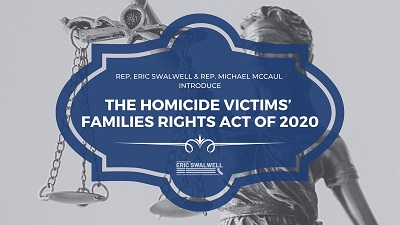McCaul & Swalwell Introduce Bipartisan Bill to Give More Rights to Families of Homicide Victims in Federal Cases
 Yesterday, Congressmen Eric Swalwell (CA-15) and I introduced the bipartisan Homicide Victims’ Families Rights Act of 2020, to equip the families of homicide victims with the tools to work with law enforcement in federal cases.
Yesterday, Congressmen Eric Swalwell (CA-15) and I introduced the bipartisan Homicide Victims’ Families Rights Act of 2020, to equip the families of homicide victims with the tools to work with law enforcement in federal cases.
Swalwell and I are both are former prosecutors: I was a federal prosecutor and a Texas deputy attorney general, while Swalwell – a member of the House Committee on the Judiciary – was an Alameda County (Calif.) deputy district attorney.
“Losing a relative to homicide is an unimaginable nightmare, made even worse when nobody is held accountable,” Swalwell said. “With more and more ‘cold cases’ piling up, we can and must do better for victims’ families. Our bill offers another chance to have their loved ones’ cases reviewed, and to get some justice and closure. I’m grateful to be working with Rep. Mike McCaul on this important issue.”
As a former federal prosecutor, I have worked alongside law enforcement to help bring the truth to light in cold cases. For me, it seems unimaginable to have a loved one taken away from you and your family so suddenly. Unfortunately, the Austin community knows this tragic reality all too well. In 1991, four girls were murdered in a local yogurt shop in Austin and to this day we do not know who is responsible. It is my hope that this bill will give these Austin families - and others like them - the tools to work with law enforcement to reveal new information and pursue justice on behalf of their loved one.
The Murder Accountability Project (MAP) used FBI data to calculate that the percentage of homicides for which someone is charged has steadily declined from over 90 percent in 1965 to under 65 percent in 2018. As a result, there are more than 250,000 U.S. homicides since 1980 for which no one has been charged, according to MAP.
Sadly, declining homicide clearance rates for cases with Black victims accounted for this alarming trend, MAP found. Reported clearance rates for whites (including ethnic Hispanics), Asians, and Native Americans actually improved slightly from 1976 through 2017.
The Homicide Victims’ Families Rights Act of 2020 would give relatives of victims of homicide under federal law the right to have their loved one’s case file reviewed, once the case has gone cold after three years. If the federal investigator feels it would lead to probative leads, a full reinvestigation would then occur. The bill also would require the federal government to notify relatives and similarly situated persons of their rights and provide updates on any cold case review that’s undertaken. Finally, it would collect data on the problem of cold cases generally.
“Sometimes it just takes another set of eyes to discover a fact that was overlooked, or a new test that wasn’t available when the case first was investigated, to find the offender,” Swalwell said. “I also hope this bill will inspire states and localities to follow suit so that all homicide victims’ families can have more hope of justice, regardless of the level of government that’s prosecuting the case.”
Swalwell and I drafted the Homicide Victims’ Families Rights Act of 2020 with the help of former federal prosecutor Glenn Kirschner and Katharine Manning, a former U.S. Department of Justice senior attorney advisor who specializes in victims’ rights and services.
Among organizations and people supporting this bill are Homicide Family Advocates, the National Coalition Against Domestic Violence, Murder Accountability Project, the American Investigative Society of Cold Cases, Parents of Murdered Children, the Association of Prosecuting Attorneys, the National Organization for Victim Assistance, and Ryan Backmann, survivor and founder of Project: Cold Case.








